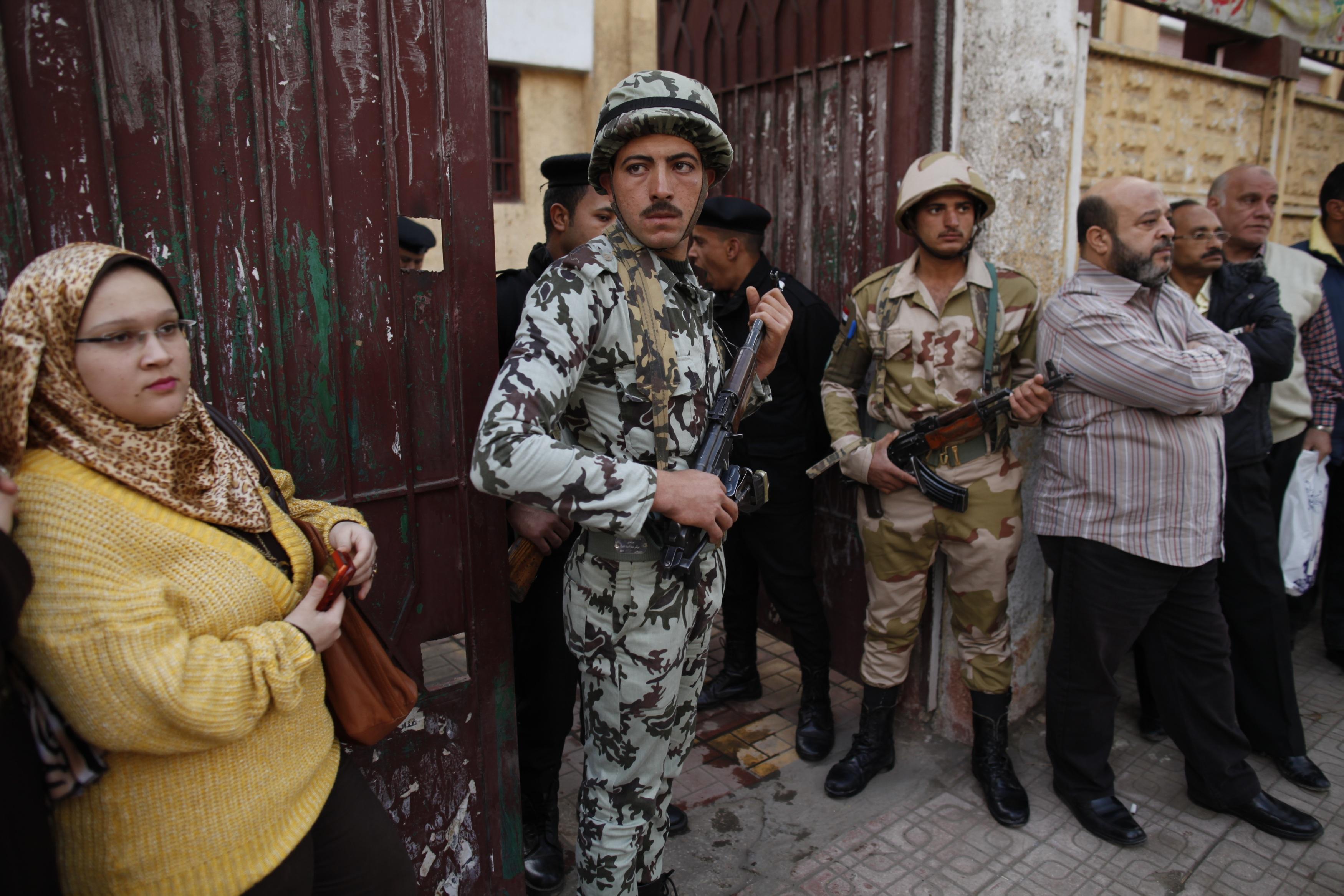Latest NEWS
- Aswat Masriya, the last word
- Roundup of Egypt's press headlines on March 15, 2017
- Roundup of Egypt's press headlines on March 14, 2017
- Former Egyptian President Hosni Mubarak to be released: lawyer
- Roundup of Egypt's press headlines on March 13, 2017
- Egypt's capital set to grow by half a million in 2017
- Egypt's wheat reserves to double with start of harvest -supply min
- Roundup of Egypt's press headlines on March 12, 2017
Egypt's women candidates get creative in campaign season

Soldiers stand guard as people wait outside a polling center to vote in referendum on tge new constitution of Egypt in Cairo December 15, 2012. REUTERS/Khaled Abdullah
By Rahma Diaa
Women vying for a spot in Egypt's male-dominated public space tell stories of phenomal success or abject failure, with very little in between.
When it comes to political participation, the picture is bleak. Despite the lip service offered by politicians and decision-makers, Egypt has an unflattering record of women in politics, with numbers far below other North African countries like Algeria, Morocco and Tunisia.
The number of women participating in Egypt's up-coming House of Representatives elections is 308, a sharp drop from the number of candidates in the 2011-12 legislative polls when 984 women took part, but not unexpectedly only 11 (two percent) ended up occupying seats in parliament, two of them appointed.
This year female candidates are working relentlessly to make their mark. With the current elections law guaranteeing a total of 70 seats (56 to be elected through party or coalition lists and 14 under a "special groups" quota) women are slated to hold a minimum 12 percent of seats.
To that end, they are stepping outside the box in their campaign strategy to attract their main target: other women.
While some have kept their campaigning strategies gender-neutral, others are gifting potential voters with kitchenware or holding seminars on women's health.
Independent candidate in Daqahliyah province north of Cairo, Nagwa al-Asheery is also a former undersecretary at the ministry of health. She is trying to win over women by organising medical convoys and providing free healthcare to villages and small towns in the province.
"Election campaigning is very expensive. The battle is fierce and we need support from women's organisations and foundations to be able to compete with men," she said.
Asheery has also organised educational seminars on women's health, complete with entertainment contests and trivia with gifts like cutlery sets, pots and tablecloths.
Hoda Zakaria, a political sociology professor said that the government's failure to provide services in the past gave candidates who filled the gap a bigger chance at winning. This remains true today, she said.
Zakaria believes that the candidates' choice of campaign activities depends on the audience. The campaigning used in working class neighbourhoods would be starkly different from those used in posh ones, she said.
Mona Aboulmagd, another independent candidate running in Menoufia province north of Cairo is sticking posters with her photograph on cars and tuktuks, three-wheel vehicles commonly used for hire in working class and economically challenged areas.
She also had her picture printed on the plastic bags of pharmacies and stores. Aboulmagd says she is self-funded and is spending within her available budget.
Taking a similar approach, Sahar Sedki who has printed her pictures on class schedules and multiplication tables where they are likely to be spotted by schoolchildrens' mothers. Sedki is running on the "For the Love of Egypt" coalition's list in the Upper Egyptian city of Qena, south of Cairo.
Neamat Qamar, however, is taking a different tack. Running in the northern province of Gharbiya, she is riding on her popularity among textile company workers in Mahalla city, the hub of Egypt's weaving and textile industry.
"I am the oldest unionist in the weaving and textile sector ... and the men here fear me," she says.
Qamar is the Democratic Peace Party candidate and says her campaign budget is currently EGP 100,000 (around $12,770) but is hoping to get more support from the party.
For the time being, she plans to make her presence known by setting up a wedding marquee where she will hang up her picture and posters and send an open invitation.
Zakaria, the political sociology professor, does not believe that there should be a difference between campaigning by men or women, and believes that the most important factors are competitiveness and the ability to build trust.
Some of the approaches taken so far by women candidates open up channels of communication with women who influence the votes of their husbands and sons, she explained.
Ebtesam Abu-rehab, who is also running on the "For the Love of Egypt" coalition list in the New Valley governorate is taking a gender-neutral approach by focusing on technicalities: she is teaching voters how to vote for independents and lists in order to reduce the number of invalid votes.
"I am communicating directly with the voters," she said, adding that she is knocking on doors, holding small meetings and reaching out to people over the telephone.
Zakaria applauds such methods, saying that the most effective campaigns are the ones that use "direct communication."
Independent Samia Bayoumi, on the other hand, believes that the internet plays a very important role. She has set up a Facebook page where she presents her CV and platform. She also uses it to communicate with the youth.
Bayoumi may be taking the right approach for a specific target, says Zakaria.
"The internet can play a role in Cairo and other urban provinces but it doesn't have much effect on people who do not use modern communication technologies."










